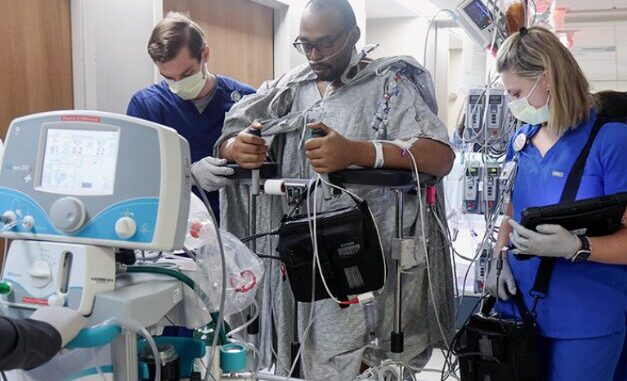
DURHAM, N.C. – A young father from Graham, N.C., has become the second person globally to receive a BiVACOR Total Artificial Heart (TAH) as a temporary solution while awaiting a transplant, living with the device for 10 days before undergoing surgery at Duke University Hospital. The BiVACOR TAH completely substitutes a patient’s heart muscle, ensuring proper blood circulation throughout the body. It serves as a vital interim solution for patients with biventricular heart failure who are on the transplant waiting list. Duke’s use of this device was part of a pioneering clinical trial aimed at assessing the safety and efficacy of the BiVACOR TAH. This option is available for eligible patients with severe biventricular or univentricular heart failure when left ventricular assist device support is not advisable. “Although various methods exist to assist patients with advanced heart failure while they wait for transplants, conventional approaches proved ineffective for this patient, whose heart showed dysfunction on both sides,” explained Dr. Carmelo Milano, chief of the Division of Cardiothoracic Surgery at Duke. “The BiVACOR TAH completely replaced his heart and restored normal blood flow, enabling a successful transplant just 10 days later.” The recipient is a 34-year-old education consultant expecting his fourth child. Donavon Harbison, a recreational runner and former football player at N.C.
Central University, initially thought he was suffering from pneumonia when he began feeling unwell in late 2023, only to receive a heart failure diagnosis. “It was a shock,” said his wife, Lindsey. While attempting to manage his condition with medications, diet, and lifestyle adjustments, Harbison discovered in the spring that his heart condition was genetic, likely contributing to his father’s early death. Following additional tests, his doctors at Cone Health in Greensboro, Dr. Daniel R. Bensimhon and Dr. Aditya Sabharwal, determined he had end-stage biventricular heart failure and referred him to Duke for a heart transplant. “We can offer our patients various devices like VADs and ECMO, but providing them with the highest level of care—such as heart and dual-organ transplants,
As Harbison’s condition rapidly worsened, he was provided with a ventricular assist device, but it wasn’t sufficient for his needs. After considering other options, he and his team at Duke decided to proceed with the artificial heart. “There was definitely a fear of the unknown,” Donavon Harbison admitted. “However, at that point, I was determined to take a leap of faith and do everything possible to ensure a successful outcome.” “Now, I’m excited to return to making memories with my family—my kids and my wife—doing the everyday things we often take for granted, like putting my kids to bed at night.” Harbison received the BiVACOR device in early August, becoming the second person in the world to do so, following the first implantation in Texas just weeks earlier. With the device effectively circulating blood, he regained enough strength within 10 days to qualify for a donated heart. “Many patients with end-stage heart disease are too ill to receive heart transplants,” said heart surgeon Dr. Jacob Schroder, part of the transplant team. “While current technologies are beneficial for some, others still lack viable options. Introducing another method to bridge the gap to a transplant would significantly fill a critical need and be a true lifesaver.” The BiVACOR TAH employs a straightforward electro-mechanical rotary blood pump that is simpler than other investigational devices.
It features no valves and is powered by a single magnetically levitated rotor that pumps blood to both the body and the lungs simultaneously. “It was an incredible opportunity for our team to witness the recovery and successful transition to transplant for our second BiVACOR TAH patient at Duke,” said Dr. Daniel Timms, founder and chief technology officer of BiVACOR. “He and his family approached this innovative technology with a positive mindset, which not only extended their lives together but also offers hope to many others facing end-stage heart failure.” The BiVACOR device is the second total artificial heart to be implanted through a clinical trial at Duke. In 2021, the heart transplant team became the first globally to successfully implant a different technology developed by CARMAT. “The Duke heart transplant team has been at the forefront of pioneering new technologies that broaden access to heart transplants,” stated Dr. Adam DeVore, medical director of the Duke Heart Transplant program. “Given the lengthy waiting lists for the limited supply of donor hearts, it’s crucial that we keep discovering innovative ways to optimize these scarce resources.”
Leave a Reply